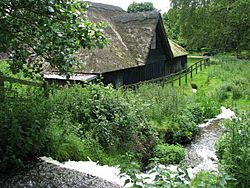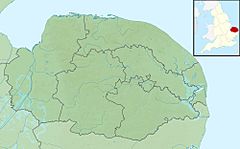Hagon Beck facts for kids
Quick facts for kids Hagon Beck |
|
|---|---|

Hagon Beck and Gunton Park Sawmill
|
|
|
Location of the river mouth within Norfolk
|
|
| Country | England |
| State | Norfolk |
| Region | East of England |
| District | North Norfolk |
| Physical characteristics | |
| Main source | North of the Village of Roughton, East of England, England 148 ft (45 m) |
| River mouth | Feeds into Great Lake in Gunton Park 52°51′48.5″N 1°17′55.8″E / 52.863472°N 1.298833°E |
| Length | 3.2 mi (5.1 km) |
| watermills Gunton Watermill Gunton Park Sawmill |
|
Hagon Beck is a small stream, also called a watercourse, in Norfolk, England. It starts in the northern part of the county, near the village of Roughton.
This little stream flows into a larger lake called Great Lake, which is located in Gunton Park. The water from Great Lake then feeds into Suffield Beck. Suffield Beck is a smaller stream that eventually joins a bigger river called the River Bure. For a long time, Hagon Beck was important because it powered two watermills. One was at Gunton, and the other was a sawmill in Suffield Park.
Gunton Watermill: An Ancient Mill
The Domesday Book, a very old survey from 1068, mentions a watermill on Hagon Beck at Gunton. This mill kept working throughout the Middle Ages.
However, when the land where the mill stood was sold in 1676, the mill was no longer in use. Even so, a map from that time showed that the millpond, the area of water that fed the mill, was still there. The millpond also appeared on an Ordnance Survey map from 1838.
By the time the 1838 map was made, Hagon Beck had been blocked by a dam. This dam created the large lake known as Great Water, which was just north of where the old mill used to be. It's very likely that building this dam caused the Gunton Watermill to stop working. Great Water was actually created to provide power for another mill: the Gunton Park Sawmill.
Gunton Park Sawmill: A Unique Survivor
The Gunton Park Sawmill was built in 1824. Its main job was to cut timber (wood) for the huge Gunton Hall Estate, which was about 12,000-acre (4,900 ha) big.
This sawmill is special because it's the only water-powered sawmill still working in Norfolk today! It was built as a simple wooden building with three open sides. It has a unique roof made of local Norfolk reed, which is a type of thatch.
Hagon Beck supplied water to the lake, and the sawmill was built below the water level. This clever design used the water's power to turn two large water wheels. Each wheel was 12-foot-diameter (3.7 m) and 5-foot-wide (1.5 m). They were called breastshot wheels because the water hit them around the middle.
A special gate, like a guillotine, controlled the water flow to the wheels. One wheel powered a main saw that moved back and forth, cutting large pieces of wood. The other wheel powered a circular saw and other tools. There was even a small mill for grinding corn at the site! After the water left the sawmill, it flowed back into Hagon Beck, rejoining the original stream. The sawmill is now looked after by the Norfolk Windmills Trust.


